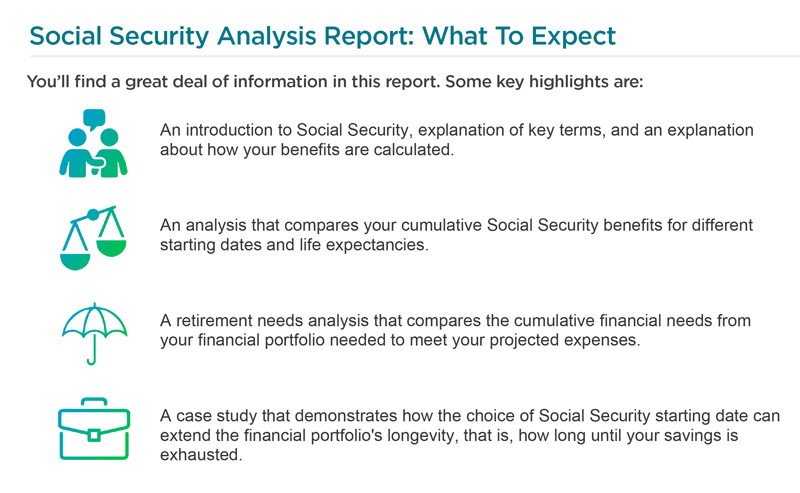By Daniel H. Yoo, CFP®, CEPA®
When it comes time to begin collecting Social Security, you want to maximize your benefits. But to do so, there are decisions to make and several moving parts to consider, such as: when to begin collecting, tax implications, spousal benefits, and how social security benefits relate to eligibility for Medicare and disability benefits.
Having a strategic plan in place facilitates that decision-making process and will help ensure you properly fund your retirement goals for the rest of your life.

How Social Security Works
Funded by payroll taxes of the current workforce, Social Security is a federal insurance program that provides monthly income to qualifying retired workers and their dependents. Social Security also pays disability and survivors’ benefits.
A few facts to understand:
- On average, Social Security benefits replace roughly 40% of a worker’s pre-retirement salary. [1]
- You receive a Social Security statement three months before you turn 60.
- Social Security can be claimed as early as age 62. This is considered your full retirement age (FRA).
It’s important to note that the longer you remain in the workforce, the more your monthly Social Security benefit is likely to be. For example:
- If you choose to begin receiving Social Security benefits before your FRA, your monthly benefits will be reduced.
- If you delay the start of benefits until after your FRA, your monthly benefits will be increased. You can delay until age 70.
As you can see, there is a tradeoff between claiming benefits earlier and receiving more, smaller payments or waiting to claim benefits and receiving fewer but larger payments. On average, for every year you defer taking the benefit, your benefit will increase by 8%.
4 Key Considerations for Determining the Right Time to Claim Social Security Benefits
In general, there are two main factors that drive the amount of your Social Security benefits:
- At what age you begin receiving Social Security benefits
- How much you earned and contributed to Social Security during your 35 highest-earning years
However, maximizing your Social Security income hinges upon choosing the right time to begin collecting Social Security. That choice involves a comprehensive assessment of several other factors, some of which are within your control.
You may retire from a career at age 62, but beginning benefits at age 62 may not be your best choice.
When you elect to begin receiving Social Security payments is important.
The age at which you begin will impact your benefits for the rest of your life — and potentially the benefits available to your spouse, if you are married.
To choose the optimal date to begin collecting benefits, you’ll need to consider the following:
- Your health status and life expectancy. If you’re in good health and see no reason you wouldn’t live until age 80, then it may be in your best interests to delay your Social Security claim. If you haven’t already done so, commit to a healthy lifestyle. Moderate amounts of exercise and modest changes in eating habits can turn into significant health benefits.
- Your predicted need for income. It’s important to understand how much you’ll be relying on Social Security A comprehensive assessment of your retirement portfolio will ensure you make the right decision about whether or not to delay your claim.
- Spousal benefits. Spousal benefits are Social Security benefits that are based on your spouse’s work record rather than your own. Depending on when you and your spouse elect to claim Social Security benefits, if your spouse earned significantly more or your work history is limited, you may get more money from spousal benefits.
- Whether or not you plan to continue working. If you continue working while collecting Social Security, your benefit could be reduced.
An effective analysis requires careful consideration of the inputs, assumptions, and other factors that will impact your Social Security benefits.
Avoid Mistakes and Boost Overall Retirement Income
Unfortunately, most people don’t really understand how Social Security works.
Either they claim too early, miss out on important aspects of the program, or fail to leverage strategies that could boost their lifetime income. Such mistakes can be very costly.
Working with a professional to analyze your Social Security benefits in the context of your overall retirement income plan can make a material difference in the amount of income available to you in retirement.
- Consider Social Security as just one piece of the larger retirement income equation. It’s important to evaluate Social Security in the context of your broader financial picture. For example, although Social Security and Medicare provide different benefits, they can overlap when determining eligibility for benefits and collecting Medicare premiums.
- Minimize taxes on your retirement income. Many people are not familiar with how Social Security benefits are taxed in relation to other forms of retirement income. With the help of an investment advisor, you may be able to leverage strategies to reduce the impact of taxes on your overall retirement portfolio.
Learn More
If you’ve never analyzed the options related to your social security benefits, we can help. To learn more, click on the button below to schedule a free consultation with the experts at PBMares.





